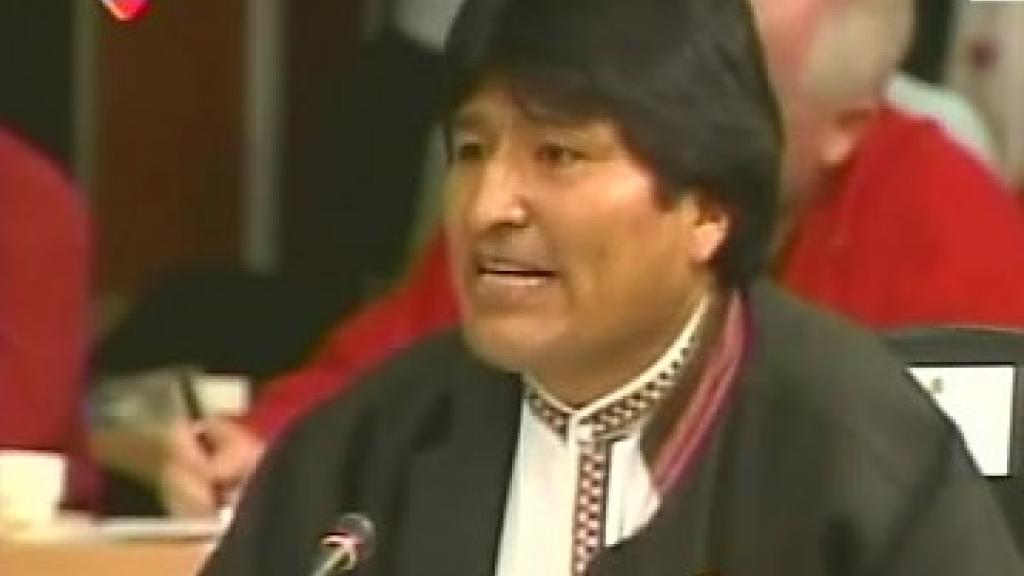Evo Morales: `I declare myself Marxist ... now let the OAS expel Bolivia'

During his intervention at the seventh ALBA Summit, Bolivia's president Evo Morales recalled the 1962 documents of the Organisation of American States (OAS) that resulted in Cuba being expelled from the organisation, and outlined the importance of reflecting on the motives of that expulsion.
The resolution indicates that the adherence of any member country to Marxism-Leninism, and the association of any member government of the organisation with the communist bloc, broke the unity and solidarity of the hemisphere. Therefore, given that the government of Cuba identified itself as Marxist-Leninist, it was incompatible with the purpose of the OAS and was therefore excluded from participating.
“Cuba was expelled for being Leninist, Marxist, communist. I want to say to the members of the OAS, here, I want to declare myself Marxist, Leninist, communist, socialist and now let them expel me, I want them to expel me from the OAS. It is unbelievable that for being Marxist-Leninist one can be expelled from the OAS”, exclaimed Morales.
He made reference to the recent declarations made by the US Secretary of State Hillary Clinton, who said that there is no democracy in Cuba.
“The US has no right or authority to speak of democracy, because they are the ones that foster coups, military coups, just as they are now arming a civic coup in Bolivia.”
He highlighted the fact that on the other hand Cubans exercise full democracy, where bribes or million-dollar campaigns do not exist.
ALBA council on human rights
Morales proposed the creation of an ALBA Council for Human Rights. His proposal is motivated by the fact that there are many international institutions that issue reports on human rights, but they only report on anti-imperialist governments. “No matter what good things we do, they never recognise them, they do not take into consideration that we are in a process of liberation of deep transformation”, argued Morales.
He stated that these international human rights institutions only condemn governments of liberation. Therefore, he proposed the creation of an ALBA Council for Human Rights, to be able to tell the truth about human rights.
He pointed out that the general objective should be to investigate and denounce political, military and cultural interference, carry out investigations on policies that go against our countries, establish a permanent system of monitoring media attacks, exchange of information amongst countries that make up the council to evaluate systematic violations of human rights, promote the exercise of human rights, especially in regards to sovereignty and self-determination of the member countries.
According to his proposal, the council would be made up of representatives of all the member countries, representatives of social movements, human rights experts and representatives of any non-member country that wanted to be part of the council.
Evo Morales gave thanks for all the international solidarity he received during his recent struggle for the approval of an electoral law in Bolivia and expressed his enormous satisfaction of being there as part of the anti-imperialist struggle, which he indicated is the struggle of our peoples.
He highlighted the creation of the Sucre [currency], as another form of thinking about solutions to the financial crisis. He affirmed that the relationship which Bolivia has with the IMF and World Bank now is different, given all the conditions they have put on his nation.
Translated from Aporrea by Federico Fuentes, editor of Bolivia Rising.
Raul Castro at ALBA strategy meeting in Venezuela
By Circles Robinson
HAVANA TIMES, April 16, 2009 — Cuban President Raul Castro arrived in Cumana, Venezuela, on April 16 for a meeting of the Bolivarian Alternative of the Americas (ALBA), called by Venezuela's President Hugo Chavez.
The date is to analyse the regional and global impact of the current international economic crisis and get ready for the Summit of the Americas to take place in Trinidad and Tobago beginning April 17.
ALBA is a regional integration effort that stresses social development, cooperation and mutually beneficial trade. The members of the body founded in 2004 are Bolivia, Cuba, Dominica, Honduras, Nicaragua and Venezuela.
The six nations are expected to seek common positions for the Trinidad and Tobago meeting that will include US President Barack Obama and all Latin American and Caribbean countries (34) – except Cuba.
The exclusion of Cuba from gatherings like the Summit of the Americas is a point that Venezuela’s Hugo Chavez promised to address head on. He has repeatedly stated the importance of Cuba and its contribution to the region and rejected US pressure to ostracise it for opting for a socialist system.
“I hope the president of the United States is going to listen” at the summit, Chavez was quoted as saying on April 16. Chavez, like Brazil’s Luiz Inacio Lula da Silva, have advised Obama that the key to a fresh start for the deteriorated US relations with Latin America is rapprochement with Cuba and ending the nearly half-century blockade on the island.
Lula and Colombia's President Alvaro Uribe will propose at the summit in Trinidad and Tobago that Cuba be included in future gatherings, said Lula’s international relations advisor Marco Aurelio Garcia.
Cuba's President Raul Castro has repeatedly stated that he is willing to discuss any and all subjects with the US on equal terms. The Caribbean island believes the ball is in the US court to mend relations since for decades Washington has been the aggressor.
The Summit of the Americas will coincidently take place on the anniversary of the April 17-19, 1961, Bay of Pigs invasion that tried to cut short the 1959 Cuban Revolution.